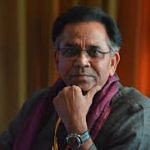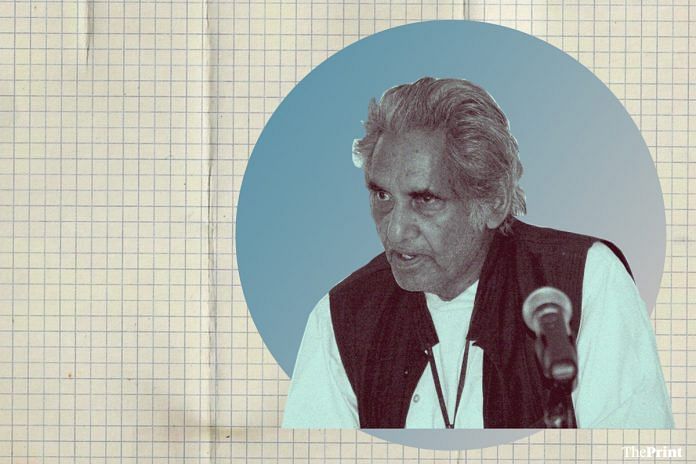Veteran poet and noted lyricist Gopaldas Neeraj passed away Thursday after he suffered a serious head injury.
The 93-year-old who gave Hindi cinema numerous evergreen hits like ‘Prem ki pujaari hum hain’ and ‘Rangeela re mere man main’ was a Padma Bhushan and Padma Vibhushan recipient.
ThePrint asks: As India mourns legendary Neeraj, is the era of poetry over in Bollywood music?
Neeraj was famous much before Bollywood wanted him
 Ashok Chakradhar
Ashok Chakradhar
Hindi author and poet, former professor at Jamia Milia Islamia
There is no doubt that Neeraj’s demise means the end of an era. He was the zenith of Hindi literature’s oral poetry tradition.
Neeraj took forward a wave of literary culture that legends like Harivansh Rai Bachchan started in the 19th century. He is credited with making poetry popular, taking it to villages and communities.
His association with Bollywood was much later and it was not Bollywood that brought him fame. Rather, because he was so popular, Bollywood sought his presence. While associated with the industry, he wrote close to 200 songs.
He remained in the poetry circle for close to 70 years. When the city of Mumbai did not appeal to him, he went to Aligarh and continued with his poetic traditions there.
It is important to see the artist in totality and not associate him with Bollywood.
His poetry is dedicated to the philosophy of humanity and love. Like the philosopher Kabir, Neeraj too was a saintly figure who did not run after monetary gains and led a simple life.
As far as poetry in today’s Bollywood music goes, poetry never dies. Each time period sets its own trend and those become the signature styles of that era. Earlier too, not everything was poetry. Sometimes, rhythm overpowers the music and vice versa. Ironically, today rhythm has taken over all aspects of music. Subtlety is not only absent from music, but even from our thoughts and the society.
With Neeraj’s death, Hindi cinema has lost a distinctive voice but era of poetry not over
 Pavan Jha
Pavan Jha
Founder, Gulzaronline.com
Neeraj’s demise is a great loss for Indian literature and Hindi film music. Although he was not a prolific lyricist as his contemporaries, his contribution to Bollywood is highly significant as he brought a refreshing change to film songs with a unique poetic imagery as well as simpler words. He was a poet of the highest order and yet a reluctant lyricist. Neeraj found it difficult to adjust to the practices and deemed himself a misfit for the place. He restricted his collaboration to just a few filmmakers and music directors.
Neeraj has been a significant signature in Bollywood, but he avoided becoming an influencer. With the departure of Neeraj, Bollywood has lost a distinctive voice, but I don’t think it is the end of the era of poetry. We still have veteran poets like Gulzar and Javed Akhtar actively contributing to film lyrics. On the other hand, as Bollywood is now serving a generation of millennials with newer sensibilities, younger lyricists like Swanand Kirkire, Kausar Munir, Amitabh Bhattacharya, Varun Grover, Raj Shekhar are still holding the flag for poetry in film lyrics. With times Bollywood has changed too and Neeraj himself has described the change so well in his poetry:
है अनिश्चित हर दिवस, हर एक क्षण
सिर्फ़ निश्चित है अनिश्चितता यहाँ
इसलिए सम्भव बहुत है, प्राण ! कल
चाँद आए, चाँदनी लाए न लाए!
Songwriting is much more diverse in Hindi film music than a decade back
 Mihir Pandya
Mihir Pandya
Assistant professor (Hindi), Delhi University
This is a common doomsday expression that poetry and melody in Hindi film music are dying under hard techno beats. You can call it the post-Rahman-phenomena in other words. The reality is that the present scenario of film songwriting is far more diverse and democratic compared to a decade back.
Right now there are multiple generations at work in the lyric-writing scene, each with their own unique worldview. We are fortunate to have legends like Gulzar and Javed Akhtar still working. Listen to the soul-touching poetry by Gulzar in the song ‘Dilbaro‘ or the tactical use of Iqbal’s poem ‘Lab pe aati hai dua’ in Raazi and you will know why they are there on that high pedestal. Then there are Irshad Kamil, Swanand Kirkire and Prasoon Joshi, a link generation between the melodious old and the experimental new.
Amitabh Bhattacharya, Varun Grover, Kausar Munir, Anvita Dutt and Raj Shekhar are some of my absolute favourites, who are actually multifaceted film writers working on different forms of creative writing along with their organic lyrics. They are experimental, they are audacious and the songs they write belong in the film scripts. The songs of Dev D give the film its actual character, and what would Masaan be without the poetry of ‘Tu kisi rail si guzarti hai‘? We are blessed to have them. Yes, there are not as many women in the field as there should be, but this will change soon I’m sure.
There is a whole new generation of lyricists coming up. The likes of Hussain Haidry, Puneet Sharma, Gaurav Solanki and Sagar are making the mark. All wonderful Hindi poets, they knew our literature roots well before coming to the industry. Poetry in Hindi cinema is certainly not dead yet. Won’t believe me? Google and listen to a poem called ‘Hindustani Musalman’ by Hussain Haidry, a young lyricist in Kashyap’s new film Mukkabaaz, and you will know what I’m talking about.
Poetry in Hindi films died a long time ago, and a large part of it went with Neeraj
 Gautam Chintamani
Gautam Chintamani
Writer and Film historian
In the late 1990s, Karan Johar’s Kuch Kuch Hota Hai (1998) played an all-important role in Hindi cinema’s transformation from the antiquated to cool. This was not the kind of film in which you would expect to hear the word ‘sanjota’ in a song but you did. If it was surprising to come across a line like ‘tanhai mein dil yaadein sanjota hai ’ back then, today, it would practically be impossible to even imagine a mainstream Hindi film soundtrack to feature such words. In just two decades, many words have nearly been forgotten because their usage in powerful tools like popular Hindi cinema has reduced. The death of poet-lyricist Gopaldas Neeraj is one such instance that reminds us how much Hindi film songs have changed.
Neeraj was a breath of fresh air in the late 1960s and early 1970s. His words revived the beauty of songs in Hindi films. Much like the doyens of the progressive writers’ movement like Majrooh Sultanpuri, Sahir Ludhianvi, Shailendra, who changed the lexicon of Hindi film lyrics and made poetry and ghazal accessible to the common man, Neeraj, too, with his simple style that never compromised on the quality gave audiences a reason to smile. In a short span of time, Neeraj penned gems like ‘Mera mann tera pyaasa’ (Gambler, 1971), ‘Phoolon ke rang se’ (Prem Pujari, 1970) with the sublime line ‘Sanson ki sargam, dhadkan ki beena, sapnon ki geetanjali tu mann ki gali mein mehke jo hardum aisi juhi ki kali tu’ and many more.
With the exception of the last of the great poets like Gulzar, poetry in Hindi films, with due respects to contemporary lyricists, died a long time ago. A huge part of it has left us forever with Neeraj.
Compiled by Sankalita Dey and Deeksha Bhardwaj, journalists at ThePrint.




famous and top Bollywood poets ?